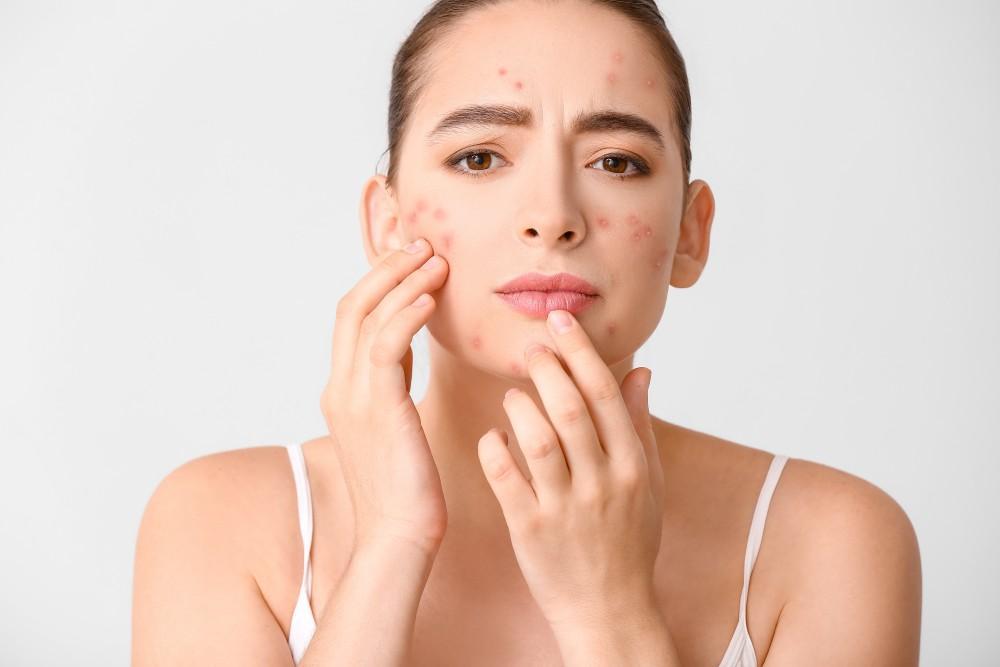Dealing with acne-prone skin can be frustrating and sometimes disheartening. However, with the right skincare routine and products, you can manage breakouts and achieve a clearer complexion. Here are some essential tips and strategies to help you care for acne-prone skin.

1. Use a Gentle Cleanser
Cleansing is crucial for keeping acne at bay. Use a gentle, non-comedogenic cleanser twice a day to remove excess oil, dirt, and makeup. Look for cleansers containing salicylic acid, which helps to unclog pores, or benzoyl peroxide, which kills acne-causing bacteria.
2. Don’t Over-Wash Your Face
While it’s important to keep your skin clean, over-washing can strip your skin of its natural oils, causing it to produce more oil and potentially leading to more breakouts. Stick to cleansing your face twice a day, and after heavy sweating.
3. Exfoliate Regularly but Gently
Exfoliation helps remove dead skin cells that can clog pores and cause breakouts. However, be gentle to avoid irritating your skin. Use a chemical exfoliant with ingredients like salicylic acid or glycolic acid 2-3 times a week.
4. Moisturize Daily
Even if you have acne-prone skin, moisturizing is essential to keep your skin balanced and hydrated. Choose an oil-free, non-comedogenic moisturizer that won’t clog your pores. Ingredients like hyaluronic acid or glycerin can help keep your skin hydrated without adding excess oil.
5. Use Acne Treatments Correctly
Spot treatments with ingredients like benzoyl peroxide, salicylic acid, or sulfur can be effective for treating active breakouts. Apply these treatments directly to the affected areas after cleansing and before moisturizing. Be mindful not to overuse them, as they can cause dryness and irritation.
6. Incorporate Retinoids
Retinoids, derived from vitamin A, can help prevent acne by promoting cell turnover and keeping pores clear. Start with a low concentration and gradually increase usage as your skin adjusts. Retinoids can be potent, so it’s best to use them under the guidance of a dermatologist.
7. Avoid Picking or Squeezing Pimples
It can be tempting to pick or squeeze pimples, but this can lead to scarring and further inflammation. Instead, use spot treatments and let your skin heal naturally.
8. Choose Non-Comedogenic Products
When selecting skincare and makeup products, look for those labeled as non-comedogenic, meaning they won’t clog your pores. This helps reduce the likelihood of breakouts.
9. Maintain a Balanced Diet
Your diet can impact your skin. Avoid excessive consumption of sugary, greasy, or processed foods, which can trigger acne. Instead, focus on a balanced diet rich in fruits, vegetables, lean proteins, and whole grains.
10. Manage Stress
Stress can trigger acne flare-ups by increasing oil production and inflammation. Incorporate stress-relieving practices like yoga, meditation, or regular exercise into your routine to help manage stress levels.
11. Keep Your Hands Off Your Face
Touching your face can transfer bacteria and oils from your hands to your skin, leading to breakouts. Try to avoid touching your face and keep your hands clean.
12. Clean Your Phone and Pillowcases Regularly
Your phone and pillowcases can harbor bacteria and oils that contribute to acne. Clean your phone regularly with disinfectant wipes and change your pillowcases at least once a week to minimize exposure to these contaminants.
13. Use Sunscreen Daily
Sun protection is crucial for all skin types, including acne-prone skin. Choose a broad-spectrum sunscreen that is oil-free and non-comedogenic. This helps protect your skin from UV damage without causing breakouts.
14. Stay Hydrated
Drinking plenty of water helps to keep your skin hydrated and can aid in flushing out toxins that may contribute to acne. Aim for at least eight glasses of water a day.
15. Consult a Dermatologist
If over-the-counter treatments aren’t effective, consider consulting a dermatologist. They can provide personalized advice and may recommend prescription treatments to help manage your acne more effectively.
By following these tips and maintaining a consistent skincare routine, you can effectively manage acne-prone skin and work towards a clearer, healthier complexion. Remember, patience and consistency are key, as it may take time to see significant improvements.

